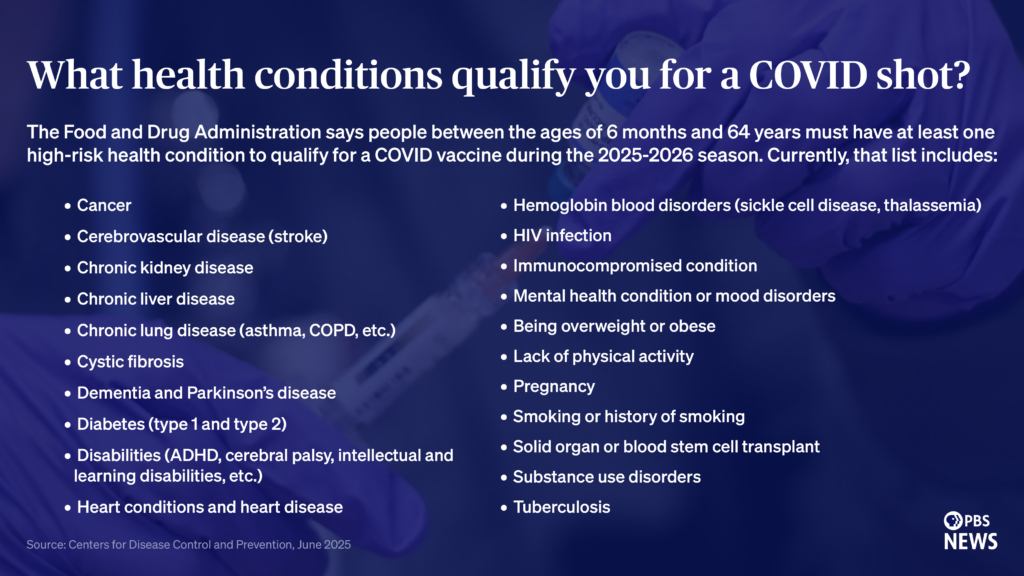Crisp weather is popping up across the United States, signalling the start of fall, a new school year and, of course, respiratory virus season. But five years after the emergence of the COVID-19 pandemic, access to vaccines against the virus in the U.S. is on shaky ground.
Today, many people are wondering if they will be able to get vaccinated at all, particularly against COVID, after changes to vaccine guidance by the Trump administration.
READ MORE: FDA approves updated COVID-19 shots with some restrictions for kids and adults
Health Secretary Robert F. Kennedy Jr., a former anti-vaccine advocate who has spread misinformation about vaccines and autism, has led several U.S. policy and personnel changes so far, including more narrow national recommendations for who should get a COVID booster, firing and replacing a panel of health experts who advise the Centers for Disease Control and Prevention on vaccines and reportedly firing CDC Director Susan Monarez over disagreements about vaccine science.
Kennedy’s statements and actions are a far cry from U.S. health policy a year ago, when anyone aged 6 months or older could get vaccinated against COVID, which was the 10th leading cause of death in August 2024, according to provisional data from the federal government. People are now reeling from “the culture shock,” said Dr. Georges Benjamin, executive director of the American Public Health Association.
Here’s advice from medical experts about who can get vaccinated this fall.
Can I get vaccinated against the influenza and RSV?
The flu vaccine is available for everyone ages 6 months or older, said Dr. James Campbell, a pediatric infectious diseases specialist with the University of Maryland Medical Center and vice chair of the Committee on Infectious Diseases for the American Academy of Pediatrics.
The vaccine for RSV, or respiratory syncytial virus, is available for people who qualify, Benjamin said.
According to the CDC, those who can receive this vaccine are:
- Adults aged 75 or older
- Adults between the ages of 50 and 74 who are at risk of developing severe illness
But pregnant people also should consider getting vaccinated against RSV between 32 and 36 weeks of gestation if that time period falls between September and January. That would offer their fetus protection against the virus, which Campbell said is the “No. 1 cause of hospitalization for children under the age of 1.”
Can I get vaccinated against COVID this fall?
Updated COVID vaccines will be available this fall after the CDC’s Advisory Committee on Immunization Practices meets on Sept. 18, but the Trump administration has erected more barriers for healthy children and adults to access that protection, Benjamin said.
Who is eligible to get vaccinated against COVID?
The Food and Drug Administration last week announced that people who qualify to receive the COVID vaccine this season include :
- Those aged 65 or older
- Those 6 months or older and have at least one high-risk health condition
“This is a big departure from past years, and it is quite unusual for the FDA to restrict a vaccine this way,” epidemiologist Katelyn Jetelina told PBS News Hour’s Amna Nawaz.
WATCH: Epidemiologist breaks down new restrictions on COVID shots
These recommendations from the Trump administration contradict guidance from medical societies, such as the American Academy of Pediatrics and the American College of Obstetricians and Gynecologists, which have recommended COVID vaccines for children who are 6 months or older and for pregnant people.

Graphic by Jenna Cohen/PBS News
Even within the Trump administration, there is inconsistent messaging around who should get vaccinated against COVID, Benjamin said. Kennedy said in May that the CDC would no longer recommend “healthy” pregnant people receive vaccine protection against the virus. But in its list of high-risk health conditions that qualify a person to get vaccinated, the CDC includes pregnancy.
“The way this policy is being rolled out, it’s out of order, it’s inconsistent, it’s very unclear, it’s not transparent, has left a lot of pharmacies and physicians and families scrambling,” Jetelina told PBS News Hour.
People who do not meet the age or diagnostic requirements for a COVID vaccine will need to consult with their physician and get a prescription for the vaccine, Benjamin said.
Will insurance cover my COVID vaccine?
Maybe. To make sense of these inconsistencies, Benjamin recommends that people call their health insurer to find out if their COVID vaccine dose is covered for the 2025-2026 season. But he also acknowledged that can create another barrier for people who may not have time to contact their insurance provider.
“We went from a single-payer universal health care plan for COVID — testing, coverage and vaccinations — to now a very complicated patchwork of who gets what and how do we pay for it,” Benjamin said.
Can I get last season’s COVID vaccine?
Yes, if you can find a dose from last season, said Michael Osterholm, an epidemiologist who directs the University of Minnesota’s Center for Infectious Disease Research and Policy. But anticipating the arrival of COVID vaccines for the 2025-2026 season, many pharmacies and clinics have tossed out last season’s doses, Osterholm said.
Last year’s dose “likely has good cross-protection from the current variant” and could offer a “boost” in protection, he said. But with uncertainty around the latest vaccine’s availability, and with COVID infections rising, Osterholm said, “It’s a challenge to know what to do — go get the old vaccine or in two weeks hope to get the new vaccine.”





